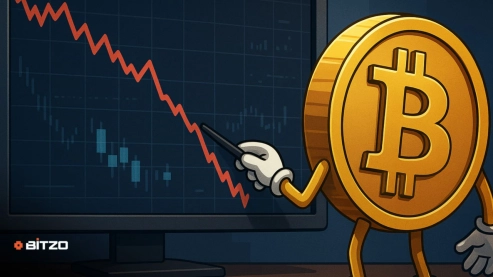A Brief History Of Bitcoin
Bitcoin (BTC) has dominated the news since November, when it began a stunning rally that took it past the $100,000 mark, a historic milestone, on its way to setting a new all-time high of $108,268. The post-election rally has brought Bitcoin into the spotlight, with the flagship currency registering a substantial jump in institutional interest. While Bitcoin has become the center of attention in the crypto and, to an extent, the traditional finance world, it had humble beginnings.
What Is Bitcoin?
Bitcoin was created in response to the 2008 financial crisis and the growing disillusionment with the existing system. Satoshi Nakamoto, Bitcoin’s pseudo-anonymous creator, introduced the cryptocurrency to the public as a way to give them control over their funds. Bitcoin is designed to act as money and a form of payment outside the control of any one person, group, or centralized entity. Since its introduction, it has become the world’s largest and most popular cryptocurrency, with its popularity spawning hundreds of other cryptocurrencies.
Bitcoin is based on blockchain technology, and all data related to transactions (buyer info, seller info, metadata) is recorded on the blockchain in blocks connected to each other cryptographically.
History Of Bitcoin
Contrary to popular belief, Bitcoin is not the first cryptocurrency. Cryptographers had been toying with the idea of cryptocurrencies much before Bitcoin. The history of cryptocurrencies goes back to 1983, when American cryptographer David Chaum, called the “Godfather of cryptocurrency” proposed eCash. He pioneered the launch of Digicash in 1989, but it failed to gain traction. The most well-documented effort at creating a cryptocurrency before Bitcoin was by Nick Szabo, who devised BitGold. BitGold was never officially launched but is widely regarded as the precursor to Bitcoin.
The domain name Bitcoin.org was registered in August 2008 by Satoshi Nakamoto and Martti Malmi, who closely worked with Nakamoto on Bitcoin’s code. The domain was registered after Nakamoto published the Bitcoin whitepaper by Nakamoto. The now-famous whitepaper titled “Bitcoin: A Peer-To-Peer Electronic Cash System” gave us the first glimpse into the concept of Bitcoin and how it can be utilized for peer-to-peer transactions on the internet. Nakamoto announced his work on Bitcoin to the cryptography link at metzdowd.com, stating,
“I've been working on a new electronic cash system that's fully peer-to-peer, with no trusted third party.
The first Bitcoin block, called the Genesis Block, was mined on January 3, 2009. It contains the following text.
“The Times 03/Jan/2009 Chancellor on brink of second bailout for banks.”
During its early days, 1 BTC was valued at a fraction of a penny. It first went above $1 in early 2011. By late 2017, its value skyrocketed and topped out near $20,000. Subsequent rallies saw BTC cross $50,000, $65,000, and $80,000. BTC’s latest bull run took the flagship cryptocurrency beyond $100,000.
Key Moments In Bitcoin’s History
-
2008: An unknown individual going by the name of Satoshi Nakamoto published the Bitcoin whitepaper “Bitcoin: A Peer-to-Peer Electronic Cash System.
-
2009: Bitcoin is officially launched, giving the world the first glimpse at a decentralized currency.
-
2013: Bitcoin was named the best investment of the year by Forbes.
-
2014: Bloomberg named Bitcoin the worst investment of the year.
-
2021: The Securities and Exchange Commission (SEC) approved ProShares Bitcoin Strategy (BITO), the first US Bitcoin futures Exchange Traded Fund (ETF).
-
2024: The Securities and Exchange Commission Approves 11 Spot Bitcoin ETFs.
-
December 2024: Bitcoin crosses $100,000
In Closing
Bitcoin is credited with the creation of the entire crypto sector. BTC’s staggering success has led to considerable interest in crypto as investors hunt for the “next Bitcoin.” Several companies have added Bitcoin to their balance sheets, while countries like El Salvador gave it the status of legal tender and added it to their strategic reserves.
In this brief article, we have looked at Bitcoin’s humble beginnings. In the next part, we will understand how Bitcoin works.
Disclaimer: This article is provided for informational purposes only. It is not offered or intended to be used as legal, tax, investment, financial, or other advice.
Investment Disclaimer

















